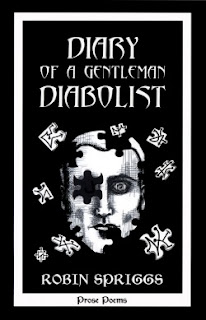Robin Spriggs' Diary of a Gentleman Diabolist Reviewed
Monday, July 12, 2010

Robin Spriggs' new collection of prose poems, Diary of a Gentleman Diabolist whirls toward the indefinable. Prose poetry itself seems like an odd and engaging anachronism, and the effect is doubled when it is used as a genre-bending skeleton for Spriggs' strange and macabre content. This ambiguity and ethereal charm marks him as a flexible practitioner of the truly unknown and truly fearful, and his latest book collects his workings, somewhere deep in the hinterlands inundated with the weird, the fantastic, and the occult.
The selections inside Diary of a Gentleman Diabolist range from a few short sentences to story length passages. With few exceptions, Spriggs manages to christen his well written pieces with the symbolic depth of poetry in few words. Some stories read as occultic rites, while others make painfully truthful observations about existence. Yet, most of these prose poems are self-contained tales that resonate deeply with the inexplicable imagery and otherworldly vistas common to weird fiction's best. Added to this is the sense of interconnectedness between these stories, which really makes one feel as though they are reading some forgotten diary uncovered in an old chest. But whose? A madman's, a sorcerer's, or a demented poet's? The best answer is all of the above.
Pieces like "Liber I," "Liber Ba," and "The House of Nine" draw on a seemingly rich knowledge of real occultism by Spriggs. But within these rituals are other currents, parallel meanings that are forced to cohabit an incredibly limited space. Readers will uncover philosophical musings on the temporal and the imaginary, as well as a sense that they are eavesdropping on the author's most private concerns and self-reflections. Direct ties between this occultic wordsmithing and the book's pure fiction is not always obvious, but these intermittent passages bridge the gap between fiction and spiritualism, giving the whole of Diary a mystical potency.
Spriggs' fables, this collection's real center, are nearly as diverse as the project as a whole. "The Yordhla" chronicles the onset of strange entities seeking their lord, wrapped in curious and unsettling language very much at home in the weird genre. "Withershin," on the other hand, seems like the bastard offspring of magical realism and dark folklore in describing the leg altering curse that befalls a town's inhabitants. "The Brides," which gives readers a minuscule peak at ghosts from another world, is just as horror inducing in its rich imagery and melancholy mood. On another level, "Practical Magic" and "Through a Doll, Darkly" are nasty and hilarious prose poems very reminiscent of the late Thomas Wiloch's work.
Whether he is doing humor, thought exercises, horror, or magic, Spriggs hits the target about 98% of the time. A tiny handful of pieces fall short in their effect and purpose, however. "Lagomorpha" and "Charge of the Dung Beetle" are too short, and come dangerously near to breaking the spell woven by Spriggs' many excellent offerings. Fortunately, these weaker prose poems are exceptionally rare and mercifully short, and barely even figure into one's reflections on the overall journey--one worthy enough to be taken time and time again.
In an era where technology is abundant and attention spans are short (guess the correlation), prose poetry may well be due for a comeback. It is not impossible, however unlikely, to imagine the Stephenie Meyer readers of today becoming the weird fiction aficionados and creators of tomorrow. Writers like Robin Spriggs may be just the ticket to lead them there. Those who have never experienced the truly magical, frightening, and surreal before Spriggs may not come back after venturing through Diary of a Gentleman Diabolist, and those who have tread the strange many times will have one more uneasy stroll to take when Anomalous Books releases this collection in September, 2010.
-Grim Blogger
